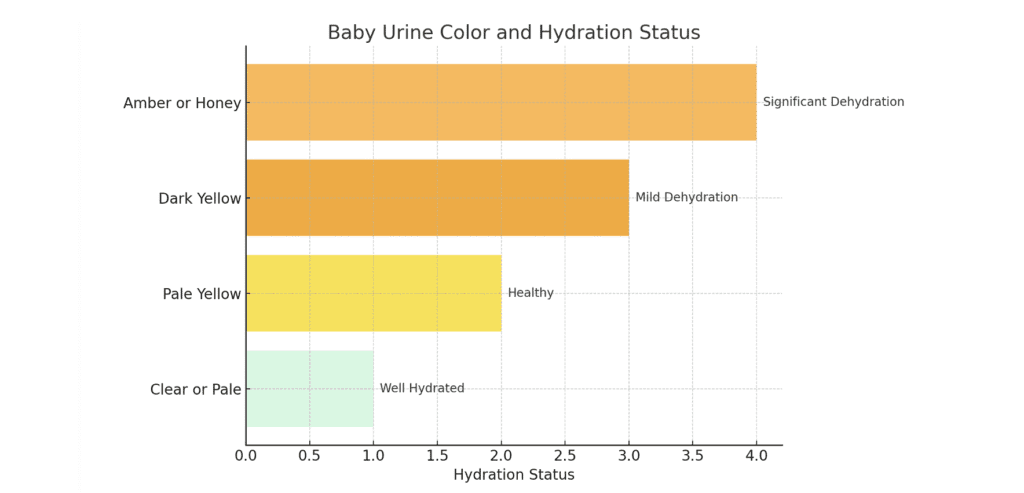Understanding Baby Pee: A Complete Guide to Smell, Color, Frequency, and When to Be Concerned
As a parent, it’s natural to feel concerned if your baby’s pee smells strong. While a newborn’s urine is typically yellow and odorless, changes in color, smell, and frequency can sometimes indicate underlying issues. It’s important to recognize that not all changes in urine are alarming. Occasionally, the strong smell can be attributed to factors like foods, medication, or illness. For instance, if your baby is hydrated and the pee remains pale yellow, there’s likely no cause for concern. However, if the smell is persistent or accompanied by symptoms like a fever or irritability, it’s crucial to seek advice from a pediatrician to rule out any health conditions such as a urinary tract infection (UTI) or dehydration.
When babies don’t feed well or experience changes in their feeding schedule, it can also impact their urine smell. In some cases, a strong smell may signal medical issues like UTI, where bacteria in the urinary tract lead to an infection. Dehydration can also cause concentrated urine, giving it a stronger odor. Understanding the frequency and consistency of your baby’s pee can be a helpful indicator of their overall health. If you’re unsure, monitoring your baby’s hydration, frequency, and any changes in smell can provide a clearer picture, ensuring that you act promptly if any serious conditions arise.

Infant’s Urine Smells Strong: Common Causes and What It Means
When your baby’s pee smells strong, it can be concerning, but it’s not always a sign of something serious. Dehydration is one common cause. If your little one isn’t drinking enough water, their urine becomes more concentrated, which can lead to a stronger odor. In fact, urine can be light yellow or clear when a baby is well-hydrated, but when they are dehydrated, it may become darker and smell stronger. Another possible reason for a strong-smelling pee could be the introduction of certain foods like asparagus, onions, or garlic. Even some medications, such as antibiotics, can cause a change in urine odor.
In some cases, strong-smelling urine might indicate a health condition, such as a urinary tract infection (UTI). If your baby is showing signs like irritability, fever, or blood in their urine, it might be a UTI. Additionally, conditions like diabetes or Maple Syrup Urine Disease (MSUD) could also cause unusual, smelly urine. As a parent, it’s important to stay aware of any changes and speak to your healthcare provider if you notice any signs of discomfort, like peeing too often or having cloudy or bloody urine. Early intervention can help manage and treat any underlying issues effectively.
Top Risk Factors and Common Causes of Smelly Urine in Babies
If you notice that your baby’s urine smells unusually strong, it’s essential to consider a few possible causes. Dehydration is one of the most common reasons for pungent urine, as it increases the concentration of waste products. This means that if your baby isn’t getting enough milk or water, their urine will have a stronger odor. Another factor could be the diet—if your baby is breastfed, certain foods like onion, asparagus, and garlic in the mother’s diet can make the urine smell malodorous. Also, some medications, particularly antibiotics, may cause a change in urine odor.
In addition to diet and hydration, health conditions such as urinary tract infections (UTIs) or diabetes can also result in foul-smelling urine. If your baby has a fever, blood glucose levels might be high, leading to a sweet urine odor, which could indicate something like Maple Syrup Urine Disease. Other conditions, like liver failure or jaundice, could also be responsible for unpleasant-smelling urine. Constipation, resulting in firm bowels, can sometimes cause bladder infections that lead to a stinky odor. It’s crucial to monitor your baby’s bowel movements, ensure they’re hydrated with fiber-rich foods, and seek healthcare guidance if the problem persists.

Key Symptoms and Signs of Smelly Urine in Babies: What to Look For?
When your baby’s urine smells strong, it could be a sign of something more serious. Here are some key symptoms to watch for:
- Foamy or Cloudy Urine – If your baby’s urine appears cloudy or foamy, it may be a sign of a urinary tract infection (UTI) or other health conditions that need medical attention.
- Dark or Bloody Urine – Dark urine, such as tea-colored or pink-tinged, could indicate blood in the urine. This is a serious symptom that may signal a bladder infection or other underlying issue.
- No Urine or Oliguria – If your baby is not peeing enough, such as having no urine or very little, it could be a sign of dehydration or a serious condition like kidney problems.
- Fever and Irritability – A fever along with irritability and crying may be a sign of a UTI or another infection.
- Sunken Eyes and Dry Mouth – These signs are common in dehydration, and they can indicate that your baby needs more fluids to stay hydrated.
- Weakness and Lethargy – If your baby seems more tired than usual or is not responding to you, it could indicate a health condition requiring pediatric care.
If you notice any of these symptoms along with a strong odor in urine, it’s essential to consult a healthcare provider as soon as possible to get the right treatment.
Baby Pee Color Guide: What Parents Need to Know About Urine Colors and What They Mean?
The color of your baby’s urine is an important indicator of their health. Understanding what different urine colors mean can help you recognize any potential issues early on. Here are some key colors to look out for:
- Clear or Pale – If your baby’s urine is clear or a pale color, it’s usually a sign that they are well hydrated and their body is functioning properly. This is the ideal color for healthy urine and means your baby is drinking enough water.
- Pale Yellow – Pale yellow is the most common and healthy urine color for babies. It shows that your baby is hydrated and functioning well. This color is normal and expected as your baby grows and starts feeding regularly.
- Dark Yellow – Dark yellow urine may indicate that your baby needs to drink more water. It’s a sign of mild dehydration, and increasing hydration can help return the urine to a lighter color.
- Amber or Honey – If the urine appears amber or honey-colored, it could be a sign of more significant dehydration. If you notice this color, encourage your baby to drink more water immediately.

If your baby’s urine is dark or cloudy, or if it appears pink, red, or contains blood, it could be a sign of an underlying issue, such as a urinary tract infection (UTI) or liver problems. Always contact your doctor if these symptoms appear. Similarly, blue or green urine can sometimes result from certain foods or medications, but if the color persists, it’s best to seek medical advice.

Effective Treatment Options for Smelly Urine in Babies: What You Need to Know?
If your baby’s urine has a strong or foul-smelling odor, it’s important to address the issue with the right treatment. Here are some common treatment options:
- Rehydration Therapy: If dehydration is the cause, offering oral fluids or in some cases, intravenous fluids can help restore the balance and dilute the urine. Ensuring adequate hydration is crucial to reducing the intensity of the smelly odor.
- Breastfeeding: For breastfed babies, continuing to provide breast milk frequently helps maintain hydration and balance the urine color and smell. Breastfeeding supports the baby’s overall health and can prevent dehydration.
- Antibiotics: If a urinary tract infection (UTI) is suspected, your baby may need a course of antibiotics. This is especially necessary if the strong-smelling urine is accompanied by other symptoms like fever or irritability.
- Evaluating Underlying Conditions: If the issue persists, it’s important to have your baby evaluated for possible bladder stones, diabetes, or metabolic disorders. These conditions may contribute to persistent changes in the urine‘s smell and color.
Additionally, maintaining an adequate fluid intake and being mindful of maternal diet as certain foods or medications can alter urine characteristics, can play a role in prevention. Keeping track of the wet diapers and ensuring they are pale or straw yellow can help monitor the baby’s hydration levels.
FAQ’s
Why Is My Baby Peeing So Much? Common Causes and What They Mean?
It’s common for infants to have frequent peeing episodes, especially when they’re drinking a lot of milk. However, if your baby’s urination is excessive or accompanied by other symptoms, it could indicate an underlying issue. Crying and fever may also appear along with frequent urination, signaling that your baby might be uncomfortable or unwell. If your baby’s urine smells particularly strong, it’s worth checking for a possible urinary tract infection (UTI), a common infection in babies that often leads to a noticeable odor. A UTI can make your baby irritable, and sometimes there’s pain during urination as well.
Why Isn’t My Baby Peeing Much? Causes and What You Should Know?
If your baby isn’t peeing much or there’s a noticeable decrease in the amount of urine in their nappies, dehydration could be the reason. In such cases, it’s crucial to monitor your baby’s feeding habits, especially if you’re breastfeeding. Sometimes, babies might drink less during hot weather, which can lead to reduced urination. Also, if your baby seems more lethargic, ill, or has been oversleeping, these could be signs of dehydration or an infection, which might affect how often they pee. If you notice these symptoms, it’s best to contact your healthcare provider.
How Often Should You Change Your Baby’s Nappy? Tips for Proper Nappy Care
One of the most important things to keep track of is how often you change your baby’s nappy. For a newborn, changing the nappy around 8-10 times a day is typical, while older babies may need a change about 4-6 times. Frequent changes help keep your baby comfy and prevent rashes caused by wetness or contact with pee or poo for too long. This is especially important when your baby’s urine smells strong, as it could be a sign that their body is trying to conserve fluids. Regular feedings also play a role in ensuring your baby stays hydrated and produces less concentrated pee.
When to Take Action?
If you notice that your baby’s urine smells stronger than usual and their nappy is staying wet for longer periods without many changes in bowel movements, it could be time to step up your feeding schedule. Sometimes, babies can have less frequent bowel motions when they’re not drinking enough, leading to stronger wee. Keep an eye on your baby’s behavior—if they seem fussy or uncomfortable, it could be a sign that they need more fluid. Always make sure to change your baby’s nappy frequently to prevent any discomfort or rashes.
When to Reach Out to a Healthcare Provider?
It’s important to stay alert if your baby’s behavior changes. If your baby is ill, dehydrated, or seems more lethargic than usual, it could be due to not drinking enough fluids, an infection, or something else. These signs can indicate that it’s time to contact a healthcare provider. If your baby is peeing less/frequently than expected and showing signs of discomfort, it’s better to act sooner rather than later. If you’re noticing these signs and you’re worried about the strong smell or frequent urination, it’s time to take action. Make sure your baby is properly hydrated by offering feed regularly. Dehydration can often be the culprit when it comes to changes in urine odor. If the problem persists or worsens, it’s always best to consult with your healthcare provider to rule out any serious conditions, including diabetes or a UTI.

